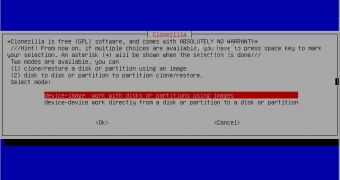Clonezilla Live, a Linux distribution based on DRBL, Partclone and udpcast, that allows users to do bare metal backup and recovery, is now at version 2.0.1-5.
Clonezilla Live 2.0.1-5 is a major step forward for this distribution as it replaces the 1.2 branch that has been developed until now.
The developer considers that only minor enhancements and bug fixes have been implemented, but the changelog is quite extensive and shows major changes in a lot of departments, including the Linux kernel.
Highlights of Clonezilla Live 2.0.1-5:
• The underlying GNU/Linux operating system was upgraded. This release is based on the Debian Sid repository, as of November 26, 2012. • The Linux kernel was updated to version 3.2.32-1; • The DRBL package was updated to version 2.1.34-drbl1 and the clonezilla package was updated to version 3.1.22-drbl1; • A KMS mode was added in the boot menu; • Partclone was updated to version 0.2.56; • A better mechanism was implemented to decide is the restored OS is using grub 1 or 2; • Program ocs-lvm2-stop now works on Ubuntu Linux; • The function install_grub_hd in ocs-live-dev should skip checking the boot loader on the USB flash drive, because it might be a new, empty one; • Saving mode now enables ncurse interface by default, too; • Boot parameters "echo_ocs_prerun" and "echo_ocs_postrun" were added. This feature can be used to disable echoing the ocs_prerun and ocs_postrun command; • An option to use "autohostname" to create the image name was added to the distribution; • Another partition table file, e.g. sda-pt.parted.compact, is now saved in image dir, when saving an image; • The description using space key to mark the selection for disk-to-disk clone is not required; • The tcplay and mpg123 packages were added.
A complete changelog featuring all the updates and new features can be found in the official announcement.
Download Clonezilla Live 2.0.1-5 right now from Softpedia.

 14 DAY TRIAL //
14 DAY TRIAL //